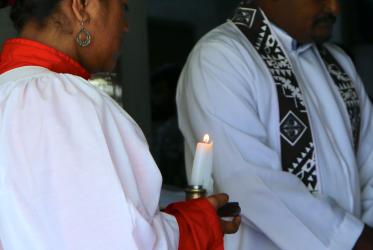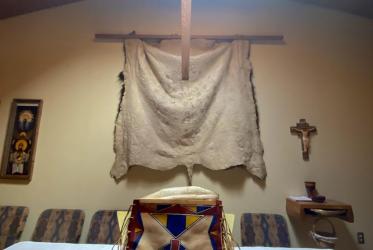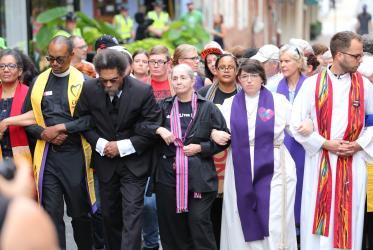Speech at the “Walk of Peace” event in The Hague, The Netherlands, on 20 September by Rev. Dr Hielke Wolters, associate general secretary, World Council of Churches
Many people dream of peace. They long for a life of not having to be afraid of bombings or of falling victim to violence. Many people dream of a place where they can live in safety and being themselves, without the stifling pressure of life-threatening ideologies or political regimes. They dream of a place where their children can grow up in peace.
However, history teaches us that for many this dream never comes true. When we look at the history of a country, we read tales of war and stories of winning and losing. The history of humanity seems to be a history of conflicts. It is highly symbolic that today's Walk of Peace passed by the Peace Palace. This magnificent building expresses a deep longing for peace. The Peace Palace was built on the great ideals of the 19th Century, before they were shattered at the harsh reality of the early 20th Century. The First World War broke out not long after the building was completed and officially opened.,.
Many of today's conflicts are associated with religion. Religious conflicts dominate the news. The Western media highlight the violence of radical Islamist groups such as Al Qaeda, ISIS, Boko Haram and al-Shabab. But violence between religions is not limited to these terrorist groups. Tensions between communities are growing in many places around the world. In many cases, religion either plays a role or is being used for economic or political purposes.
Also ethnic conflicts are on the increase once again. Racial hatred is back on the agenda, n the United States, but also in many European countries, including the Netherlands and this beautiful city of The Hague. For many years, we thought that we had learned lessons from the fight against slavery and against apartheid. For many years, we thought that increased knowledge and moral development had opened up a new era. But the tensions related to migration have shown that it is still difficult to accept multi-cultural diversity as a normal element of a modern society. The Netherlands is known as a tolerant country. Have we lost our sense of tolerance? Have we become so unsure of our identity that we must impose respect and security through violence?
I work at the World Council of Churches in Geneva (http://www.oikoumene.org/en. The World Council was founded in 1948, in Amsterdam, as one of the most important forces behind the ecumenical movement. The aim of the ecumenical movement is to promote unity and cooperation between churches. However, unity is not only an ecclesial matter– cooperation between churches has major influence on peace processes around the world.
From its inception, the ecumenical movement has been a peace movement. One of the original meanings of the Greek word oecumene is "the inhabited world." The ecumenical movement has always fought for a world that is habitable for all people, regardless of race, gender or political conviction. The World Council has therefore been involved in peace-building ever since it was founded. The Council was a builder of bridges, first between the Allies and Germany immediately after World War II and later between the newly independent countries of Asia, Africa and Latin America on the one hand, and the former colonial powers on the other. It has been a builder of bridges between black and white, male and female, advocates of economic growth and defenders of sustainable development. Dialogue with representatives of other religions has become increasingly an important part of these bridge building efforts.
Indeed, inter-faith dialogue and cooperation are essential elements of peace-building. Religion always played an important role and its importance has only increased in recent years. The number of adherents of the major religions, such as Islam and Christianity, is on the rise. This is hard to understand for a secularized country like The Netherlands, where religion appears to be of (to have?) only marginal importance. Religious leaders here have little or no influence outside their own faith communities. It is therefore difficult for us to understand that in many parts of the world a patriarch, an archbishop, a mufti, an imam or a priest has more influence than many political leaders.
The special place of the Netherlands in the world-wide religious landscape has consequences for the role that we can play in building peace. In my experience, many Dutch politicians lack the religious knowledge and sensitivity that is so much needed for playing an effective role in international debates on peace and security.
Given the importance of the religious dimension in conflict resolution and peace-building, the 2013 Assembly of the World Council in Busan, South Korea, called the churches to take part in a pilgrimage of justice and peace (http://www.oikoumene.org/en/what-we-do/pilgrimage-of-justice-and-peace). A pilgrimage, and not a `decade` as we previously called our global campaigns. The assembly called for a pilgrimage to emphasise that peace has an important religious dimension. Our commitment to justice and peace is inspired by our faith. And we certainly need our faith in the Almighty to keep us going as we walk the long path of justice and peace.
Many churches have taken up this idea of a pilgrimage of justice and peace. The World Council is closely working with churches in areas affected by conflict particularly in Iraq, Syria, Iran and in South Sudan, Nigeria, Egypt, the Democratic Republic of the Congo.
The Council of Churches in the Netherlands has also adopted the idea of this pilgrimage, and has planned a variety of initiatives over the coming years to promote justice and peace (http://www.raadvankerken.nl/pagina/3082/aanpak_pelgrimage). There will definitely be a follow-up to this Walk of Peace!
Our Walk of Peace shows the world that violence will not have the final word. We are giving voice to our belief in a better world, a world of justice and of peace. In many conflict zones, people have lost hope for justice and peace. With this Walk of Peace, we are expressing that hope is a basic human right. The right to hope for peace in our streets, in our villages and in our cities. The right to hope for peace at work and in our families and among our friends. The right to hope for peace world-wide!



